Why Terrence Malick's The Secret Life is so important today, even though it talks about the past
Educational Program Cinema / / December 28, 2020
On March 19, the film by Terrence Malick is released in Russia, which received two prizes at the Cannes Film Festival a year ago and even claimed the main award. It has already been dubbed the director's triumphant return, and this is a truly important event in auteur cinema.
It's hard to find a more controversial personality in this industry than Terrence Malick. Probably even the work of such provocateurs as Lars Von Trier, cause less confusion. Some consider Malik to be a real genius. Others, speaking about the director's latest works, accuse him of narcissism, absolute mediocrity and even insanity.
After all, if The Thin Red Line and The New World still had a clear plot, then Terrence's later films Malika, such as "Knight of Cups" and "Song by Song", were rather strange sketches about the flow of life.
But The Secret Life must end the controversy. The director filmed an incredibly strong statement about war and its victims, which literally should not be missed by anyone in the modern world. After all, we are talking here about the preservation of humanity in an atmosphere of general aggression - a very relevant topic. However, it can be difficult to endure this film.
The true story of a little man
The plot tells about a real person Franz Jägerstätter (August Diehl) who lived with his family in the small Austrian village of St. Radegund. Together with his wife (Valerie Pachner), the farmer planted potatoes, harvested crops, raised three daughters and looked after an elderly mother.
But it was in the early forties, and after the Anschluss, the Nazi government called on all Austrian men to swear allegiance to Hitler and undergo military training. Returning from the first training camp, Franz realized that he could not and did not want to fight. And then he refused to serve the Nazis. For this he was arrested and sent to jail, demanding to change his mind.
But for Franz, convictions were even more important than his own life.
The story of the real Franz Jägerstätter is not very well known, although in 2007 Pope Benedict XVI rankedANGELUS him to the face of the blessed. But still not much is said about him. Probably because this man's story is simple. He did not organize resistance actions or partisan wars - he just tried to live by his convictions. In short, the plot is not suitable for Steven Spielberg or Roland Emmerich. But for Terrence Malick he is just right.
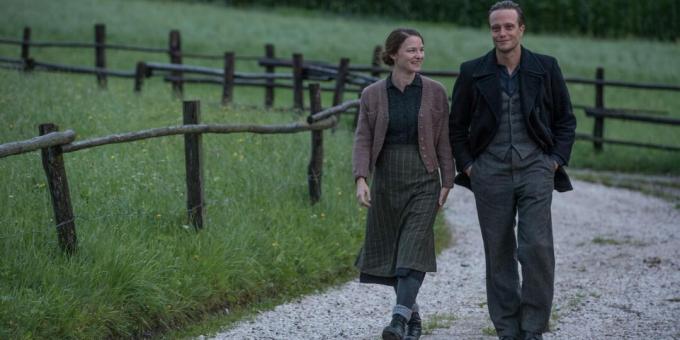
After all, this director is trying with all his might to understand himself and show others ordinary life and those important moments that make a person a person. Perhaps that is why he is accused of the absence of a plot in the films: the fate of an ordinary person is not based on sudden turns. More often than not, this is just a set of minor events.
And in "The Secret Life" there is not too much action, the whole plot can be rewritten in a couple of minutes. But more importantly, how does this film feel. And what will the viewer think about after watching.
Reading now🔥
- Why the cartoon "Forward" will delight children and bring adults to tears
Terrible contrasts
From the very first shots, the plot is built on contrasts: Franz and his wife Francis work tirelessly. They are eternally smeared in the ground, but perfectly happy. However, you can immediately understand why the camera, looking up from the close-ups loved by the director, often peers into the sky for a long time. After all, in parallel they show how Hitler comes to power in neighboring Germany. And soon planes will appear in the clear sky.
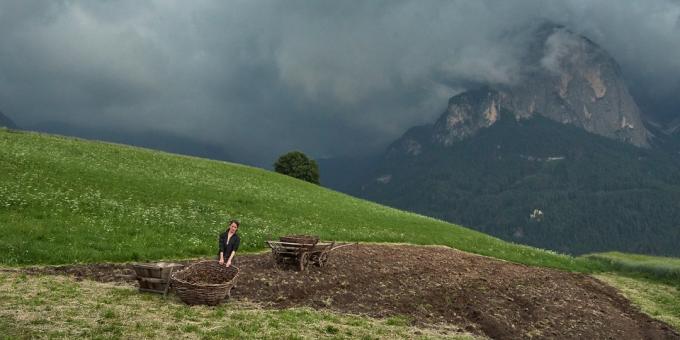
This will be the beginning of the tragedy. Moreover, The Secret Life is trying with all its might to avoid scale and deliberate cruelty. Here we are talking only about one family, their neighbors and other people who meet them on the way.
But it's this simplicity and locality that makes the plot so scary.
After all, at first, no one simply believes in the seriousness of the call, and even Franz himself speaks of the training camp as entertainment. But then a new contrast: it turns out that former friends very easily believed in new ideals and are already talking about responsibility to the country and the enemies surrounding it. And at the same time, everyone who does not agree with the bloodthirsty statements is called traitors.
And after the lines of Franz and Francis are separated, it turns out that the fate of a woman is no less tragic than that of her husband. After all, her family is turning into an outcast in her own village. And this despite the fact that the woman did nothing at all.

Contrasts continue throughout the action. Terrible events in prisons are interspersed with long, almost meditative plans of nature, which does not react at all to human strife and continues to live in its own way.
Nazi trials, interrogations and bullying are contrasted with the lives of Franz's young daughters. The modern viewer already knows that in a couple of years the war will end and the girls will grow up in a peaceful country. But Franz cannot hope for that.
The parable of the resistance
The life of the protagonist turns into an almost biblical story about the search for either God or just the truth. Malik hints at an analogy with religion more than once. You can even see the apostles who find themselves next to the human messiah, and Pontius Pilate, giving him one last chance.
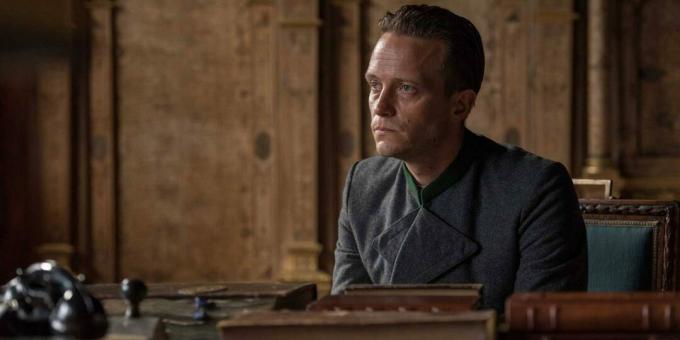
But the director speaks very ambiguously about "God's providence". The whole film repeats the truth familiar to everyone: disasters cannot happen to a good person, all good things will definitely return. But the reality turns out to be much harsher.
And it is important to understand that they do not even try to show Franz as the bearer of some higher truth. On the contrary, he himself constantly repeats that he is not sure of his righteousness, only he feels that he cannot act against his conscience. The real Franz Jägerstetter was even ready to serve in the medical unit, helping people. However, the Nazis were not too worried about the beliefs of ordinary people.
And at first glance, on-screen Franz does nothing that would make him a hero. But in fact, he retains the main thing - the belief in what he considers to be right. And he only answers all questions that the freedom of choice that God gave him is expressed precisely in the impossibility of doing otherwise. A friendly priest confirms his thoughts.
It is better to suffer injustice than to be the cause of it.
In response, they constantly try to explain to him that this will not change anything. The refusal of one person does not change the balance in the war, and his "feat" will only hurt his loved ones. And even friendly-minded people talk about this. If he refuses, perhaps it will not affect anything, the war will end, and feelings are always more important than words.
The arguments may seem reasonable. And who is right in these disputes is up to the viewer to decide. The heroes have already understood everything for themselves.
A visual masterpiece in letters
But it is not only the theme itself that makes the picture difficult for perception - Terrence Malick's directorial film is generally very specific. And the reason is not only in the slowness of the story (the picture lasts about three hours).
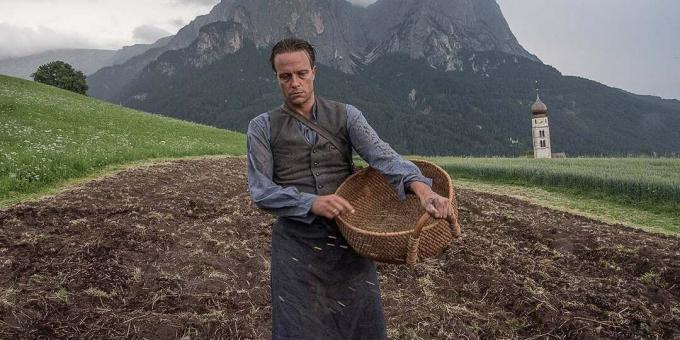
Malik always shoots at a very wide angle, up to frame distortion. Such an approach can rarely be found in mass cinema, of the films that have been sensational in recent years, only Yorgos Lantimos in "Favorite" dared to do this. This brings the camera closer to the human view. And this is how the director tries to make the viewer feel inside the picture.
Therefore, the camera can shoot from somewhere below in a scene of playing with children, as if from their perspective, or capture a very close-up of a face in an emotional scene, as if the character will just burst out of the screen to meet to the viewer. And in the scene of the beating, the camera completely takes the place of the victim, taking upon itself all the blows of the cruel warden.
The main part of the text is presented off-screen. "The Secret Life" can generally be considered a novel in letters, because the heroes most of the time communicate in the epistolary genre. The text in the frame is minimal, and sometimes even drowned out by the music. And the action is again built on contrasts - after all, in a letter to a loved one, you always want to show that things are better than they really are.
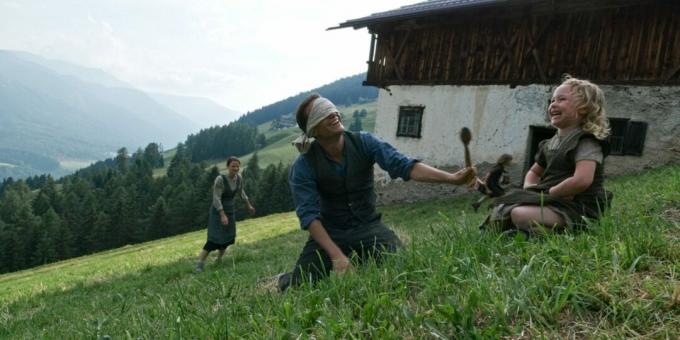
This approach does not allow any falsity either in the work of the actors or in the plot itself: any pretense will simply destroy the atmosphere. The Secret Life is built perfectly. She draws in the viewer with long rushes of cameras that replace jump cutmaking the measured movement nervous. It attracts with simply incredible footage of nature and the meticulously rendered life of ordinary farmers.
And the actors' play is frighteningly naturalistic, as if they themselves were witnesses of terrible events.
This makes you fully believe in what is happening on the screen and travel back to a terrible time when unwillingness to go against your conscience was considered a crime. Although in fact, this can be said about almost any era.
The picture is complex with its meditativeness, unusual filming and, most importantly, an attempt to show not a movie, but life itself. But more importantly, The Secret Life forces the viewer to choose and find in themselves far from the best features. And you need to be prepared that a three-hour viewing of Terrence Malick's magnificent new work will be just the beginning.
After the end of the session, everyone will be left with their thoughts and experiences - not only about the plot, but also about its proximity to today, about another confirmation of the "banality of evil" and the need to keep person. These thoughts are probably the main goal and value of the film.
How do you feel about Terrence Malick's paintings? Will you watch The Secret Life? And if you have already seen, what impressions did the film leave?
Read also📹🎞🖤
- "Lighthouse" is a minimalistic film that will drive you crazy
- 12 historical films striking in their authenticity
- 30 most anticipated films of 2020
- Empire Magazine's 100 Greatest Movies of the 21st Century
- 12 good 2019 movies you might have missed



